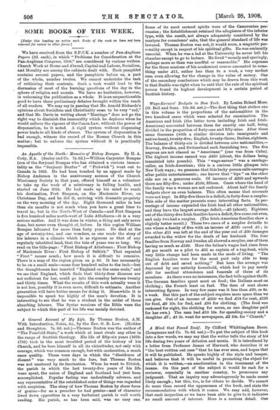Wage-Earners' Budgets in New York. By Louise Belard More, (G.
Bell and Sons. 10s. 6d. net.)—The first thing that strikes one in this volume is the proportions of the nationalities in the two hundred cases which were selected for examination. The American and Irish (the latter term including Irish and Irish- American) accounted between them for exactly, one half, being divided in the proportion of forty-one and fifty-nine. After these came Germans (with a similar division into immigrants and native-born), twenty-five ; English, twenty-three; Italian, eighteen. The balance of thirty-six is divided between nine nationalities,— Norway, Sweden, and Switzerland each furnishing two. The five negroes are not classed as " Americans " (one was from Cuba). The highest income earned was 4450 (about, the dollars being translated into pounds). This " wage-earner " was a carriage- caller, an Irish-American; this is a curious little glimpse into New York ways ; we presume that this lucky person calls carriages after public entertainments; one knows that " tips " on the other side are on a generous scale. Of incomes of 4200 and upwards there are fifty-five ; under 4100, fifteen. Cases where the head of the family was a woman are not reckoned. About half the family budgets show an even balance. This often means that accounts were not kept. In fifty-five there is a deficit, in forty-four a surplus. This side of the matter presents some interesting facts. In per- centage of income expended the Irish lead all other nationalities, and they have the largest average deficit, —45 (about). Eighteen out of the thirty-five Irish families have a deficit, five came out even, and only two had a surplus. (The Irish-American families show a slightly better result.) These two cases of a surplus dwindle to one where a family of five with an income of 4220 saved £1; in the other 411 was left at the end of the year out of 460 damages awarded to the widow for the death of her husband. The four families from Norway and Sweden all showed a surplus, one of them having as much as 4130. Here the father's wages had risen from 1.8 per month as a pilot to 425 as captain of a tug-boat, while very little change had been made in the mode of living. "The English families were for the most part only able to keep out of debt and saved nothing." But here the average was depressed by one unlucky household, which had to pay nearly 490 for medical attendance and funerals of three of its members. As there were no insurances, the fact tells against thrift. The German families spent most on food; the Italians most on clothing; the French least on fuel. The item of rent shows interesting figures. In very few cases was it less than 420, or 8s. a week. But this part of the subject requires more space than we can give. Out of an income of 4300 we find 454 for rent, 4125 for food, .29 102. for fuel, and 434 for clothing. (The food was reckoned for eight, the clothing for seven, as one daughter paid for her own.) The man had £10 10s. for spending-money and a daughter 47; 41 2s. went for newspapers, 42 10s. for "Church."










































 Previous page
Previous page